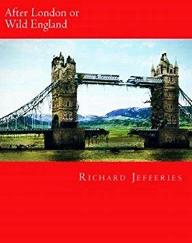 AFTER LONDON aka WILD ENGLAND (1885) – Written by Richard Jefferies. A post-apocalypse saga in which the shifting of the Earth’s axis has reduced the British Isles to a medieval level with feral animals and pockets of toxic wasteland. There are scattered “kingdoms” and roving bands of marauders but no contact with the world outside the area.
AFTER LONDON aka WILD ENGLAND (1885) – Written by Richard Jefferies. A post-apocalypse saga in which the shifting of the Earth’s axis has reduced the British Isles to a medieval level with feral animals and pockets of toxic wasteland. There are scattered “kingdoms” and roving bands of marauders but no contact with the world outside the area.
The setting is roughly 130 years after a dark celestial body passed very close to Earth, tilting the axis, unleashing tectonic shifts, damaging the climate, and altering the planet’s magnetic field. The post-apocalypse kingdoms are separated by toxic, uninhabitable regions and by forests filled with altered, deadly dogs, cattle and hogs.
 The Thames and Severn Rivers have backed up, forming a large central lake in England. What was once London is a toxic marsh so deadly to human life that its gases and vapors, when carried by the winds, kill or drive mad humans exposed to them.
The Thames and Severn Rivers have backed up, forming a large central lake in England. What was once London is a toxic marsh so deadly to human life that its gases and vapors, when carried by the winds, kill or drive mad humans exposed to them.
The buildings and streets of central London are covered in a black liquid – seemingly from deep beneath the Earth – that chokes out all life.
We meet Sir Felix, whose father Baron Aquila fell into disfavor with the local king and has been forbidden from returning to court. Felix admires his father’s focus on reviving animal husbandry and other disciplines from the past in order to start rebuilding the world, but Baron Aquila’s neglect of his military has left their region vulnerable.
 A potential political marriage to Lady Aurora from another kingdom is shot down by her father, who feels the Baron and Sir Felix are now too weak to be a desirable match. He marries his daughter off to a noble from a stronger, militarily powerful family instead.
A potential political marriage to Lady Aurora from another kingdom is shot down by her father, who feels the Baron and Sir Felix are now too weak to be a desirable match. He marries his daughter off to a noble from a stronger, militarily powerful family instead.
With Baron Aquila still refusing to let Sir Felix build up their land’s defenses, the younger man makes a crude seagoing vessel and sets out to make his fortune elsewhere. He reaches Aisi, ruled by King Isombard, a would-be Napoleon of the post-apocalypse world.
Typically, Isombard has started a war against another kingdom, so Felix enlists in the army of one of the king’s courtiers and is off to the front with his new comrades in arms. Our hero distinguishes himself in various battles and moves up the ranks enough to be included in King Isombard’s war councils.
Felix questions Isombard’s misuse of field engines and winds up thrashed and driven out of camp, warned that if caught in Isombard’s territories again he will be declared a masterless man and thus enslaved. In his new wanderings, Felix comes too close to London and is laid so low by the poisonous air that he barely manages to drag himself to safety.
 In what used to be the southernmost section of England, our man falls in with a shepherd culture where he is regarded with awe for having survived exposure to the deadly winds from London. Felix is able to organize the local men into an effective enough body to finally protect their territory from the depredations of predatory gangs.
In what used to be the southernmost section of England, our man falls in with a shepherd culture where he is regarded with awe for having survived exposure to the deadly winds from London. Felix is able to organize the local men into an effective enough body to finally protect their territory from the depredations of predatory gangs.
During the climactic battle, Felix’s deadly skill with his bow and arrows cements his status in the minds of the community and they proclaim him king. He glories in this new role and plans to eventually win Lady Aurora from her current husband.
Despite that fairly open ending, no sequel novel was forthcoming. After London or Wild England has a fun kind of Mad Max meets Game of Thrones feel to it, but the science aspects fade away the deeper readers get into the story.
Ultimately, this novel feels more like it’s trying to be “Sir Walter Scott: 2000” rather than true science fiction. A good read if you know what you’re getting into.
FOR MORE “ANCIENT” SCIENCE FICTION CLICK HERE.

Great reviews as always. I don’t find the time to read dense books nowadays, but this one sounds intriguing to me. The concept behind the book reminds me a lot of J.R.R. Tolkien’s “Lord of the Rings” book franchise. Tolkien’s book series tackled similar themes of kingdoms, territories and battles. I loved the film adaptations that have often held a precious place in my heart. For instance, I enjoyed “Hobbit: An Unexpected Journey”. It was an unexpectedly good movie though nowhere near the original LOTR trilogy. Definitely worth seeing if you are a fan of the fantasy genre.
Here’s why I recommend it:
Thank you. I appreciate the kind words!
Pingback: ANCIENT SCIENCE FICTION – AFTER LONDON (1885) – ATiA
Thank you!
https://x.com/i_america_free/status/1801434198970142924
Thank you so much!
My pleasure ☺️
😀